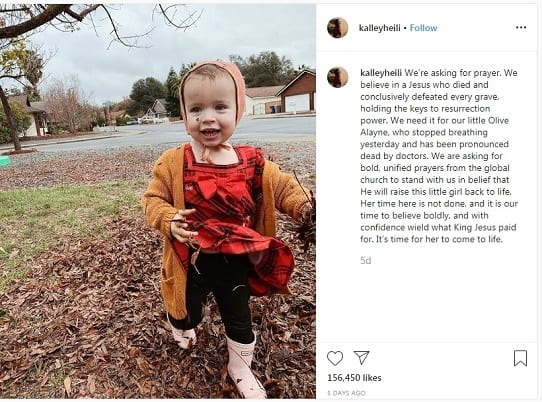
On December 14 last year, a 2-year-old girl named Olive died in her sleep.
It was a tragedy, but not a rare or extraordinary one. 15,000 children die every day, a number that’s still far too high, even if science and technology have greatly reduced it over the centuries of humanity’s long climb up from the darkness. Every death of a child is an irreversible wound, a permanent loss of the potential that each life embodies.
But Olive’s parents, Kailey and Andrew Heiligenthal, felt that they merited an exception. And the Heiligenthals were members of Bethel Church, a charismatic Christian megachurch notorious for its belief in miracles. So they did what comes naturally, under the circumstances: they decided to pray for their daughter to be resurrected.
In a series of Instagram posts beginning the day after her death, they avowed their certainty that Jesus would bring her back to life:
kalleyheili: We’re asking for prayer. We believe in a Jesus who died and conclusively defeated every grave, holding the keys to resurrection power. We need it for our little Olive Alayne, who stopped breathing yesterday and has been pronounced dead by doctors. We are asking for bold, unified prayers from the global church to stand with us in belief that He will raise this little girl back to life. Her time here is not done, and it is our time to believe boldly, and with confidence wield what King Jesus paid for. It’s time for her to come to life. (source)
kalleyheili: Day 3 is a really good day for resurrection. We are overwhelmed with gratitude by your outpouring of love for us and faith for Olive. Jesus is Faithful and True and He’s riding in with the victory He bought for Olive. Olive Alayne means “victorious awakening”. We call on the mighty all-sufficient name of Jesus and we call you back by name, sweet girl. You will live. Thank you for your faith-filled declarations, keep them coming. Worship Jesus with us, He is moving, He is good, He is worthy and He is alive. (source)
kalleyheili: Day 4 is a really good day for resurrection.
All hail, make way for King Jesus! Thank you so much for joining your faith to ours, we feel your strength and radical belief. Keep declaring life over Olive Alayne with us. “It is finished” were His last words before bursting back in resurrection life, so we’re not done. It is finished, so we’re not done. This is awakening. Come alive, Olive! (source)
Nor was this just a private effort. As one video showed, they recruited fellow members of their church to participate in ecstatic, musical worship sessions with communal prayer for a resurrection. There was also a Twitter hashtag, #WakeUpOlive, encouraging others to do likewise. Enthusiastic responses like this one duly followed:
o-LIVE
Alayne (Awaken)
Your name means Victorious Awakening and that’s what we are believing for, in Jesus name! Talitha Koum! “Little girl, wake up from the sleep of death.” Arise, sweet girl, and walk in your purpose. God’s not done with you yet. He’s only begun. #wakeupolive pic.twitter.com/lW5LvXKk9D— Sabrina (@SabrinaRoth99) December 16, 2019
The Heiligenthals and their supporters prayed unceasingly for Olive’s resurrection from the dead. A day passed, then two, then three… and perhaps that was when the outcome should have been obvious, but they pressed on, undaunted. Three days became four, then five, with no sign of progress.
I confess that I followed their daily Instagram posts with morbid fascination, wondering how long they’d keep at it. The answer came on December 20, six days after the death, when they threw in the towel:
But on Friday evening, Bethel Music — where the girl’s mother, Kalley, is a singer and songwriter — posted an “Olive Heiligenthal Update” on Instagram that suggests the family’s hopes of resurrection have been abandoned.
“Here is where we are: Olive hasn’t been raised. The breakthrough we have sought hasn’t come,” Bethel Music wrote in the post. “And so, we are moving towards a memorial service and celebration of her life.”
I want to be absolutely clear that I’m not gloating or making light of anyone’s grief. I can understand why parents who had lost a child would cling to anything that seemed to offer a ray of hope. I don’t condemn them for the impulse to seek comfort.
But the same can’t be said for the other Christians, both at the Heiligenthals’ church and online, who joined in and encouraged them to believe the impossible. Under the circumstances, that was cruel. It gave them false hope that delayed their reckoning with reality, and must have made that reckoning more painful when it inevitably arrived.
It should be pointed out that Bethel Church is no staid mainstream congregation. Its leader, the controversial pastor Bill Johnson, teaches a theology straight out of the pre-scientific age in which the world is awash in miracles and magic and the concept of natural law is hazy at best. The church runs a school, the Bethel School of Supernatural Ministry, which – no joke – teaches a course on how to perform miracles:
For school assignments, students hang out in parking lots and grocery store aisles, asking strangers who use wheelchairs or crutches if they can pray for them to heal. On Thursday nights, the budding prophets gather to listen for God’s voice, then set off on “treasure hunts” to prophesy for people who match the description God has given them — whole crews of students scouring the local megastore for a man in a yellow shirt one night, a woman with three children and a purple backpack the next.
One wonders what the final exam looks like. I have to assume it’s graded on a generous curve.
Once you know that the Heiligenthals hail from this “Christian Hogwarts”, their behavior makes sense. In the culture they’re immersed in, they hear stories of divine intervention all the time: faith healings, prophecies, exorcisms. There are many preachers who even claim to have revived the dead (here are two examples). Bethel itself boasts a “Dead Raising Team” which claims to have resurrected twelve people.* Why shouldn’t they have hoped the same could happen for them?
I find this story fascinating because it shows, by implicit contrast, the lengths that apologists have to go to in order to rationalize their beliefs in a world that fails to support them with evidence.
After all, in terms of pure theology, Bethel Church and the Heiligenthals aren’t unusual. Buttoned-down, mainstream, “respectable” Christians also believe in a benevolent god who has omnipotent power over nature, they also believe in a Bible which depicts that god as displaying this power in dramatic fashion (even to the eyes of skeptics), and they also believe in the efficacy of prayer.
But unlike Bethel Church and the Heiligenthals, most Christians seem embarrassed to pray out loud for flagrant miracles. They treat their faith like a miser treats money, carefully portioning it out, praying for things that might happen anyway in the course of nature.** The Heiligenthals are different only in that they followed these beliefs to their logical conclusion, without reluctance or hesitation.
Of course, their prayers weren’t answered. Olive didn’t return to life, and her church looks naive and credulous for expecting that she would. But that just illustrates the point.
Most Christians – and most adherents of organized religion, for that matter – practice an elaborate form of doublethink. They say they believe in miracles, divine intervention and the supernatural, but they act as if they live in a Democritean universe governed by impersonal physical laws: a universe where fire is hot, food doesn’t appear out of thin air, and the dead don’t return to life. Why wouldn’t they ask for miracles more often, unless they knew they wouldn’t receive them?
As I’ve said often, the only fatal error in religion is putting your beliefs to an unambiguous test. I’m convinced that most theists know this on some level, and skillfully avoid opportunities for disconfirmation. They do this because, in a kind of natural selection, religious beliefs which don’t shrink away from testing fail the tests, look foolish, and eventually fade away. The faiths that survive are the ones that are most adept at coming up with rationalizations for why the things they believe in are never observed to happen in the real world.
* Don’t you dare ask any follow-up questions.
** An example: this tweet from a Christian who urged people to pray for Olive in the mistaken belief that she was on life support. When he found out she was in the morgue, he withdrew his request. Why does he think that makes a difference?

















